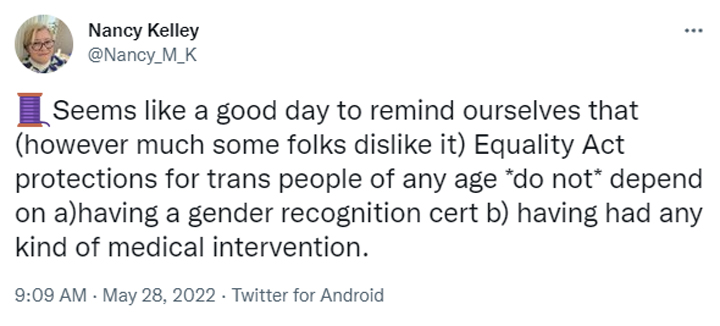Christian Concern’s Head of Public Policy, Tim Dieppe, comments on transgender guidance for schools.
The front page of The Times on Saturday carried a headline with an unusual dosage of common sense. Teachers ‘should not pander to trans pupils’, it announced. The subtitle said “Attorney-general calls for firm line on gender.”
The article reported that Attorney General Suella Braverman “said that schools are under no obligation to address children by a new pronoun or allow them to wear the school uniform of a different gender.” She also “reiterated that girls’ lavatories and changing rooms have special legal protection as safe spaces.”

She certainly encouraged a “much firmer line” on gender, stating that pupils who are born male should not be able to use girls’ lavatories or changing facilities. She also said that girls’ schools can refuse to admit boys who identify as girls to protect their single-sex status.
School pupils cannot legally change sex
Braverman made the legal position clear:
“Under-18s cannot get a gender recognition certificate, under-18s cannot legally change sex. So again in the context of schools I think it’s even clearer actually. A male child who says in a school that they are a trans girl, that they want to be female, is legally still a boy or a male. And they can be treated as such under the law. And schools have a right to treat them as such under the law. They don’t have to say ‘OK, we’re going to let you change your pronoun or let you wear a skirt or call yourself a girl’s name’.”
“Equally if they say they’re non-binary they still remain legally, and physically, the sex they were born to. The school doesn’t have to say ‘Actually OK, we’ll take what this child says and we’ll change our systems and service to accommodate this child’. It doesn’t have to do that.”
When asked whether pupils born male should be able to use girls’ lavatories she stated:
“I would say to the school that they don’t have to and that they shouldn’t. They shouldn’t allow that child to go into girls’ toilets.
“I think protecting single-sex spaces for biological females and biological males is really important, particularly in schools. There’s no duty on schools to compromise on single-sex spaces. From a safeguarding point of view you can argue that there is a duty on schools to preserve single-sex spaces, and ensure spaces are for biological females. I would extend that to school uniforms personally, I think the law allows schools to do that.”
Schools should not adopt an unquestioning approach
Her view is that it is wrong to adopt an unquestioning approach to children presenting with gender issues:
“Medical professionals, teachers should be taking a much firmer line. They shouldn’t take an unquestioning approach, they shouldn’t just take what the child says. There could be a whole host of other causes to why that child might be coming forward with these issues. It might not actually be that they want to go down the line of gender reassignment.”
So Braverman’s position is that schools are entirely within their rights to treat pupils according to their biological sex, and not their ‘transgender’ or other sexual identity. Furthermore, she believes that they have a duty to protect single-sex spaces, since that is a safeguarding issue. That means schools not only have the right, but also an obligation to treat pupils according to their biological sex.
The case of Nigel and Sally Rowe hinges on this point
Braverman’s position is precisely the position that Christian Concern has been arguing for many years. Back in 2017, Nigel and Sally Rowe found that children as young as six years old in their children’s Church of England primary school were allowed to cross-dress and identify as a different gender. School children were told that they should refer to the cross-dressing pupil using the gender they were dressed as on the day.
Understandably, their six-year-old son was disturbed by this. The Rowes took this up with the school and the Diocese, both of which justified the school’s acceptance of the pupil’s acquired gender status, and the social transitioning associated with this. In the end, the Rowe’s felt they had to take their children out of the school and educate them at home. The Rowe’s recently won permission to challenge the transgender affirming policies of the school in a Judicial Review. Their case hinges on the very point that Braverman has argued – that legally a school pupil cannot change gender and therefore they should be treated according to their biological sex.
Teacher ousted for ‘misgendering’ a pupil
In 2017, Joshua Sutcliffe became probably the first teacher in the world to lose his job for ‘misgendering’ a ‘transgender’ student. Sutcliffe said ‘well done girls’ to a group of students, one of whom later complained of wanting to be identified as a boy. Sutcliffe was found to have ‘misgendered’ the pupil and to have ‘contravened the school’s equality policy’. The attorney-general’s position implies that it is the school that was at fault here, not Sutcliffe.
Vicar resigns over school allowing a child to transition
In another case in 2019, Rev. John Parker resigned as a governor of a Church of England after school leadership granted permission for a child under the age of twelve to announce to his class his transition from a boy to a girl, without any agreed procedures or policies and without informing parents until it was too late. The school had also invited trans activist and discredited organisation Mermaids in to do staff training in trans ideology. In this case, the head teacher stated that he believed that the school was obliged under equality laws to allow the child to transition. Rev. John Parker also resigned as a vicar in the Church of England over concerns about the promotion and enforcement of politically correct ideology in his diocese, including the local diocesan education body’s approval of transgender ideology within the school. The Bishop of the Diocese at the time is now the Archbishop of York, Stephen Cottrell.
Has the Attorney General ignored equality laws?
The question of how equality laws apply to pupils who wish to change gender is a crucial one. Trans activists have long argued that the Equality Act gives protection for ‘trans people’ and have used this to justify schools recognising gender transition in pupils under 18. Nancy Kelley, Chief Executive of Stonewall, tweeted in response to The Times reporting of the Attorney General’s views:
“Seems like a good day to remind ourselves that (however much some folks dislike it) Equality Act protections for trans people of any age *do not* depend on a) having a gender recognition cert b) having had any kind of medical intervention.”

The National Education Union put out a statement saying:
“Discrimination against trans pupils is illegal under the 2010 Equality Act.
“Schools should ignore the misleading advice from the Attorney General and continue to treat their trans pupils with the dignity and respect they are entitled to”.
Ambiguous guidance
The Department for Education released guidance for schools on the Equality Act in 2014. This states that the protected characteristic of gender reassignment applies “to anyone who is undergoing, has undergone or is proposing to undergo a process (or part of a process) of reassigning their sex by changing physiological or other attributes. This definition means that in order to be protected under the Act, a pupil will not necessarily have to be undertaking a medical procedure to change their sex but must be taking steps to live in the opposite gender, or proposing to do so.” In other words, you don’t need a gender recognition certificate or to have undergone any treatment to be protected against discrimination for the status of gender reassignment.
The guidance states that therefore: “Schools need to make sure that all gender variant pupils, or the children of transgender parents, are not singled out for different and less favourable treatment from that given to other pupils.” This means precisely what it states – that such pupils should not be discriminated against or treated less favourably. It does not state that schools should therefore treat the pupils as if they how have a new gender or allow them to cross-dress or to use single-sex facilities different to their biological sex. It does not state that schools should treat a pupil claiming to be ‘transgender’ as if they were the opposite sex, although this is what the trans activists interpret it to mean.
The real problem is that there is some ambiguity in this guidance about the legal status of schools’ treatment of ‘transgender identifying’ pupils. Similar ambiguity can be found in the ECHR technical guidance for schools. Campaign group Sex Matters has helpfully summarised the ambiguity of these points.
Gender identity is not the same as gender reassignment
In fact, gender identity or gender questioning is not synonymous in law with the protected characteristic of gender reassignment. This was made clear in the recent judgment in the Maya Forstater case which stated that “the protected characteristic of gender reassignment under s.7, EqA would be likely to apply only to a portion of trans persons.” (§118).
Indeed, when the Equality Act was debated in parliament in 2010, Baroness Thornton clarified that “the definition is intended to apply to people who make a commitment over a period of time to live permanently in their non-birth gender, with or without requiring surgical intervention.” Given that the vast majority of children who experience gender dysphoria revert to deciding to live according to their biological sex, then children cannot possibly be said to have met the threshold for the protected characteristic of gender reassignment.
Let boys be boys and girls be girls
All this is to say, that our position at Christian Concern is that the Attorney General is absolutely correct in her interpretation of the law. Her interpretation also accords with common sense. School pupils should not be allowed to cross-dress and use different toilets or changing facilities just because they say they are ‘transgender’. Schools have a legal duty to protect single-sex spaces.
We hope that these statements from the Attorney General are taken into account by the courts, and by schools themselves. Meanwhile, the Department for Education is developing new guidance for schools on how to accommodate children who identify as transgender. The Education Secretary, Nadhim Zahawi has indicated that schools should “accommodate” pupils with gender dysphoria by allowing them to use opposite sex toilets and changing facilities. We hope that the Department for Education takes the Attorney General’s position into account and issues much clearer guidance stating that schools should not allow children to be treated as if they have legally changed gender.
Schools are a key battleground in identity politics. It is refreshing to see some common sense from the Attorney General. Christians should continue to stand firm in their opposition to transgender ideology and the confusion it causes. It’s the children we are most concerned for.

